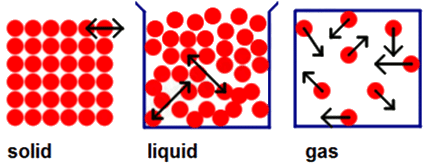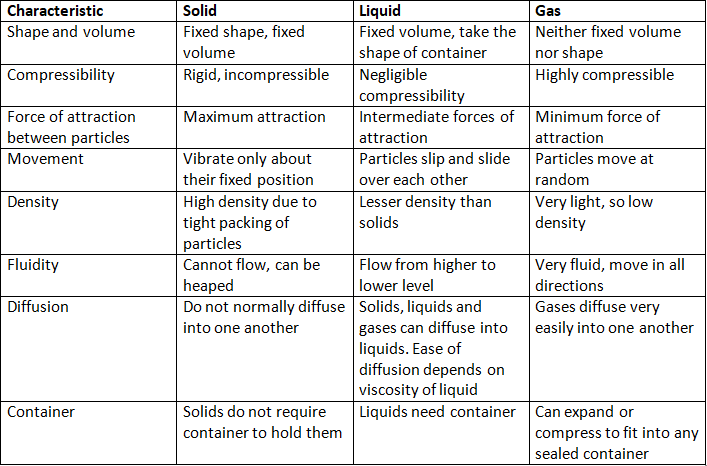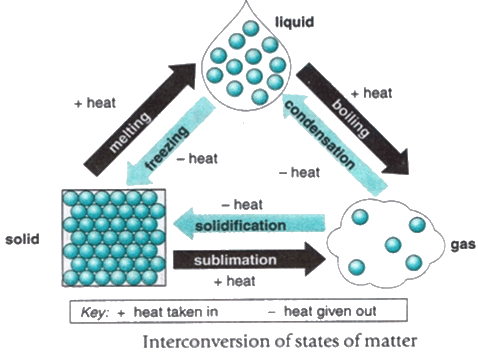Grade 6 Exam > Grade 6 Notes > Preparation for EmSAT Grade 6 > Revision Notes: The Nature of Matter
Revision Notes: The Nature of Matter | Preparation for EmSAT Grade 6 PDF Download
States of Matter
 Matter: has mass and occupies space. Three states of matter: solid, liquid, gas
Matter: has mass and occupies space. Three states of matter: solid, liquid, gas
Interconversions of states of Matter

Remember: A substance which under normal conditions is solid or liquid but changes to gaseous state under specific conditions is a vapour A substance which normally exists in gaseous state under normal conditions of pressure and temperature is a gas Boiling occurs when a liquid reaches a specific temperature and gets converted to vapour Evaporation is when a liquid changes into vapour state below its boiling point. E.g. a glass of water when allowed to stand and its volume is found to decrease due to escape of surface molecules as vapour particles
The document Revision Notes: The Nature of Matter | Preparation for EmSAT Grade 6 is a part of the Grade 6 Course Preparation for EmSAT Grade 6.
All you need of Grade 6 at this link: Grade 6
|
237 docs|47 tests
|
FAQs on Revision Notes: The Nature of Matter - Preparation for EmSAT Grade 6
| 1. What is matter and what are its basic properties? |  |
Ans. Matter is anything that has mass and occupies space. The basic properties of matter include mass, volume, and density. Matter can exist in different states, primarily solid, liquid, and gas, each with distinct characteristics. Solids have a fixed shape and volume, liquids have a fixed volume but take the shape of their container, and gases have neither fixed shape nor volume.
| 2. What are the three states of matter? |  |
Ans. The three states of matter are solid, liquid, and gas. In solids, particles are tightly packed and vibrate in fixed positions, giving them a definite shape and volume. In liquids, particles are close together but can move past one another, allowing liquids to flow and take the shape of their container. In gases, particles are far apart and move freely, resulting in no fixed shape or volume.
| 3. How does temperature affect the state of matter? |  |
Ans. Temperature plays a crucial role in determining the state of matter. When a substance is heated, its particles gain energy and move faster, which can lead to a change in state. For example, heating ice (solid) causes it to melt into water (liquid), and further heating the water can turn it into steam (gas). Conversely, cooling a gas can condense it into a liquid, and cooling a liquid can freeze it into a solid.
| 4. What is the difference between physical and chemical changes in matter? |  |
Ans. Physical changes are changes that affect the form of a substance but not its chemical composition. Examples include melting, freezing, and dissolving. In contrast, chemical changes result in the formation of one or more new substances with different properties. Examples of chemical changes include rusting of iron and burning of wood.
| 5. Can matter change from one state to another? If so, how? |  |
Ans. Yes, matter can change from one state to another through processes known as phase changes. These changes occur when energy is added or removed. For example, when heat is added to ice, it melts into water. When heat is removed from water, it freezes into ice. Similarly, when water is heated to its boiling point, it turns into steam (gas).
Related Searches





















